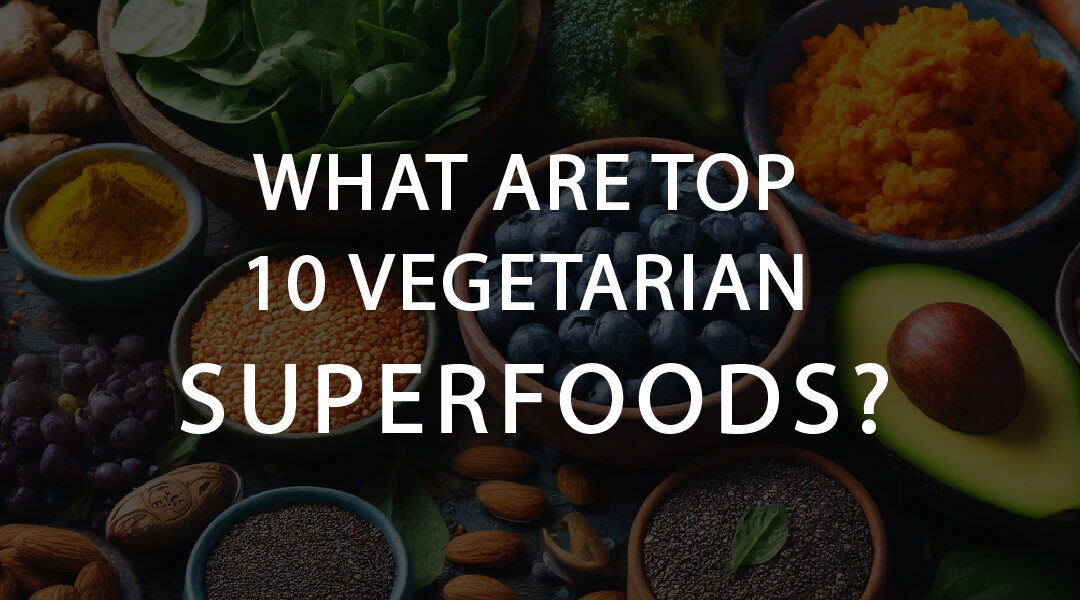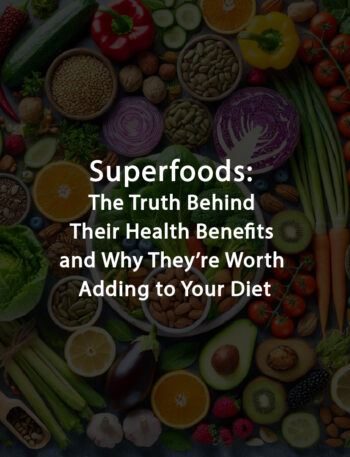Boost Your Health with These Nutrient-Packed Powerhouses!
Superfoods are nutrient-dense foods that are particularly rich in vitamins, minerals, antioxidants, and other beneficial compounds. These foods are believed to offer superior health benefits compared to other foods due to their high concentration of nutrients. While there is no official scientific definition of superfoods, they are generally recognized for their ability to boost health and prevent diseases.
Incorporating superfoods into your diet is a great way to enhance your overall health and well-being. These nutrient-dense foods are packed with vitamins, minerals, antioxidants, and other beneficial compounds that can help you stay healthy and energized. Here are the top 10 vegetarian superfoods you should consider adding to your diet for a powerful nutritional boost.
1. Spinach
Spinach is a leafy green vegetable that is incredibly rich in nutrients. It is an excellent source of vitamins A, C, and K, as well as folate, iron, and calcium. Spinach also contains powerful antioxidants like beta-carotene and lutein, which help protect against chronic diseases and support eye health. Enjoy spinach in salads, smoothies, or lightly sautéed as a side dish.
2. Blueberries
Blueberries are small but mighty when it comes to their nutritional profile. They are packed with antioxidants, particularly anthocyanins, which help reduce oxidative stress and inflammation. Blueberries are also a good source of fiber, vitamins C and K, and manganese. Add them to your breakfast cereal, yogurt, or enjoy them as a healthy snack.
3. Quinoa
Quinoa is a versatile and gluten-free grain that is rich in protein, fiber, and essential amino acids. It is also packed with vitamins and minerals, including magnesium, iron, and zinc. Quinoa’s high nutrient content makes it a great alternative to refined grains, helping to regulate blood sugar levels and support digestive health. Use quinoa as a base for salads, in soups, or as a side dish.
4. Sweet Potatoes
Sweet potatoes are a delicious and nutritious root vegetable packed with vitamins A and C, manganese, and fiber. They have a low glycemic index, which means they help regulate blood sugar levels. The antioxidants in sweet potatoes, such as beta-carotene, support eye health and boost the immune system. Enjoy them roasted, mashed, or in soups and stews.
5. Chia Seeds
Chia seeds are tiny but mighty, offering a wealth of nutrients such as omega-3 fatty acids, fiber, protein, and various micronutrients like calcium and magnesium. These seeds are also rich in antioxidants, which help protect your cells from damage. Chia seeds can be easily added to smoothies, yogurt, or oatmeal, and can also be used to make chia pudding.
6. Broccoli
Broccoli is a cruciferous vegetable that is high in vitamins C and K, folate, fiber, and potassium. It also contains sulforaphane, a compound with powerful antioxidant and anti-inflammatory properties. Broccoli is known for its potential to reduce the risk of certain cancers and support heart health. Enjoy broccoli steamed, roasted, or added to stir-fries.
7. Almonds
Almonds are a popular nut known for their high content of healthy fats, protein, and fiber. They are also a great source of vitamin E, magnesium, and antioxidants. Consuming almonds regularly can help improve heart health, aid in weight management, and provide sustained energy. Snack on almonds, add them to salads, or use almond butter as a spread.
8. Avocado
Avocado is a unique fruit that is rich in healthy monounsaturated fats, fiber, and a variety of vitamins and minerals, including potassium and folate. Its creamy texture and nutrient profile make it a heart-healthy choice that can help reduce inflammation and improve cholesterol levels. Add avocado to salads, sandwiches, or enjoy it as guacamole.
9. Lentils
Lentils are a type of legume that is rich in protein, fiber, and essential nutrients like iron, folate, and manganese. They are also low in fat and high in complex carbohydrates, making them an excellent food for sustained energy and blood sugar control. Lentils can be used in soups, stews, salads, or as a meat substitute in various dishes.
10. Turmeric
Turmeric is a vibrant yellow spice that contains curcumin, a powerful anti-inflammatory and antioxidant compound. Curcumin has been shown to help reduce inflammation, improve brain function, and lower the risk of chronic diseases. Incorporate turmeric into your diet by adding it to curries, soups, or even smoothies.
Incorporating these top 10 vegetarian superfoods into your diet can significantly enhance your overall health and well-being. Each of these superfoods offers a unique blend of nutrients that help support various bodily functions. From the antioxidant-rich blueberries that help reduce oxidative stress to the fiber-packed quinoa that aids in digestion, these foods provide a wide range of health benefits.
By making a conscious effort to include these superfoods in your meals, you can improve heart health, boost your immune system, and maintain better energy levels throughout the day. For instance, spinach and broccoli are excellent for maintaining strong bones and reducing inflammation, while almonds and avocados provide healthy fats that are essential for brain function and cardiovascular health.
Furthermore, these superfoods are incredibly versatile and can be easily incorporated into a variety of dishes, making it simple to enjoy their benefits. Whether you’re adding chia seeds to your morning smoothie, roasting sweet potatoes for dinner, or using turmeric in your favorite curry, you can effortlessly enhance the nutritional value of your meals.
Start integrating these powerful vegetarian superfoods into your daily diet and experience the positive impact they can have on your health. By doing so, you’ll be taking a significant step towards a healthier, more vibrant life.






